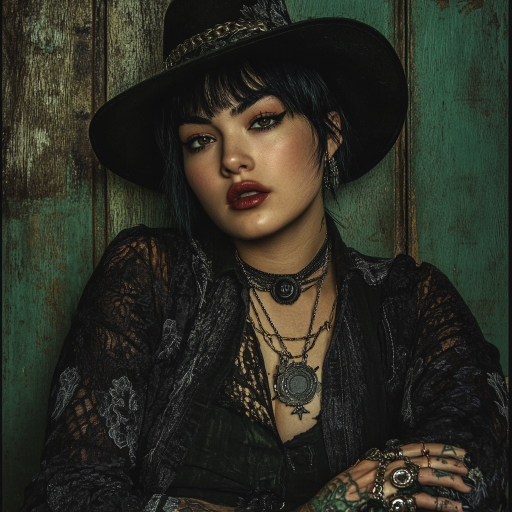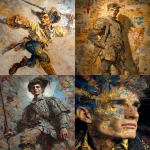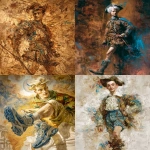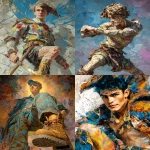Explore the Best AI Image Gallery

Harnessing AI-Generated Images: Transforming Marketing Strategies
In recent years, the advent of artificial intelligence has dramatically reshaped various industries, particularly in marketing. One of the most significant innovations is the introduction of AI-generated images, which offer a plethora of applications for brands seeking to engage their audiences more effectively. This blog post explores the profound impact of AI images on the marketing landscape, its potential uses, ethical considerations involved, and future trends.
The Impact on the Creative Industry
The creative industry has witnessed a paradigm shift with the rise of AI technologies. Previously, producing high-quality images for marketing purposes required substantial resources, including professional photographers, graphic designers, and extensive editing tools. However, AI-generated images enable businesses to create captivating visuals at a fraction of the cost and time, significantly democratizing access to quality content.
AI can analyze vast datasets to generate imagery that caters to the preferences of specific target audiences. This capability allows marketers to develop tailored campaigns that resonate deeply with consumers. Brands like Adobe have embraced AI, integrating it into their design platforms to enhance creativity and streamline workflows.
Potential Uses in Marketing
The versatility of AI-generated images offers numerous applications across various marketing strategies:
- Product Visualization: Brands can create realistic product images without the need for physical prototypes. This application is particularly beneficial for e-commerce platforms, where the visual appeal of products can significantly influence purchasing decisions.
- Content Creation: AI-powered tools can generate custom images for blogs, social media posts, and advertisements, enabling marketers to maintain a steady stream of engaging content.
- Personalized Marketing: By analyzing user data, AI can generate images tailored to individual preferences, enhancing user experience and engagement. Personalization has proven to be crucial in marketing strategies, as consumers gravitate towards brands that understand their needs and preferences.
- Brand Storytelling: Brands can utilize AI to craft compelling visuals that tell their stories, helping to establish a deeper emotional connection with consumers. Story-driven marketing has become more critical than ever as customers seek meaningful engagement with brands.
Ethical Considerations
While the advantages of AI-generated images are substantial, several ethical considerations must be addressed. One major concern involves copyright and ownership of the images created by AI technologies. If an AI tool generates an image based on the style of a famous artist, questions arise about intellectual property rights and whether the AI's output constitutes originality.
Furthermore, the potential for manipulation and misinformation is a pressing issue. With the rise of deepfakes and hyper-realistic AI images, it has become increasingly challenging for consumers to differentiate between authentic and fabricated content. Marketers must prioritize transparency and ensure that their use of AI-generated visuals does not deceive or mislead consumers.
Future Trends
Looking ahead, the role of AI in marketing is poised to expand even further. Here are some key trends expected to shape the future of AI-generated images:
- Improved Realism: As AI technologies continue to advance, we can expect to see even more realistic and visually stunning images. This progress will enable brands to create immersive and engaging marketing materials.
- Integration with Virtual Reality (VR) and Augmented Reality (AR): AI-generated images will likely play a crucial role in VR and AR applications. Businesses could use these technologies to create interactive experiences, allowing consumers to visualize products in their environments before making a purchase.
- Greater Emphasis on Diversity and Inclusion: As brands increasingly recognize the need for diverse representation, AI could provide tools to create inclusive imagery that captures a wide array of identities and experiences.
- AI-Driven Analytics: By combining AI-generated images with analytics, marketers can refine their strategies based on consumer reactions, leading to more effective campaigns.
Conclusion
AI-generated images are revolutionizing marketing strategies by offering new creative avenues while raising essential ethical considerations. As technology continues to progress, businesses must navigate these evolving challenges and leverage AI responsibly. The future of marketing lies in harnessing the power of AI-generated imagery to enhance creativity, personalization, and genuine connections with consumers.
](https://images.ai-img.art/thumbnails/150/8c3bd422d50d35735d8fb33bd314a79e30e5b150129d5d09bdad822a2007593f.webp)







](https://images.ai-img.art/thumbnails/150/1614d64dd7156c95db952258978be809eb3db8cea4453fec69c49cbdfe63fa94.webp)



](https://images.ai-img.art/thumbnails/150/3a60737a5b67fa252207ad1ae6db245a26284f53fb5846996bb34515b39ff269.webp)